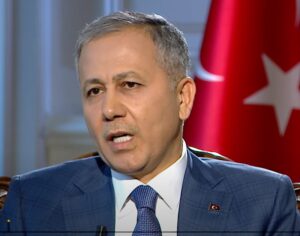Abdullah Bozkurt/Stockholm
The swift release of detained Islamic State in Iraq and Syria (ISIS) suspects has continued at a faster pace than the previous year, as indicated by the figures presented in parliament by Turkish Interior Minister Ali Yerlikaya.
During deliberations at the Budget and Planning Committee on November 8, Yerlikaya stated that as of November 1, the police had detained 2,057 ISIS suspects this year, with 524 arrested at arraignment. This indicates that three-quarters of ISIS suspects were released by Turkish authorities, a figure that stood at two-thirds last year.
Additionally, the Turkish minister refrained from disclosing information regarding the number of convicted ISIS suspects or the outcome of hearings for those who were arrested.
The Turkish judiciary, under strict control and guidance from the Islamist government of President Recep Tayyip Erdoğan, has often adopted a lenient approach when dealing with armed jihadist groups, including ISIS, in Turkey.
In October a survey conducted by Nordic Monitor revealed that a significant number of ISIS suspects detained in police operations, carried out under orders from public prosecutors, were released. For example, in the western province of Izmir, where police detained 21 ISIS suspects, including foreign nationals, on October 30, only three were arrested by a court.
On October 11 Turkish authorities in Ordu province released an Iraqi national who had been wanted on terrorism charges and was facing an outstanding arrest warrant. The release occurred after a brief period of police detention.

In the southeastern province of Gaziantep, where ISIS has long been operating with various cells, police detained 18 ISIS suspects on October 27. However, only four were arrested. On the same day in Bursa, police detained seven people on ISIS terrorism charges, but only one was sent to prison pending trial.
Moreover, the Erdogan government continues to classify the number of ISIS convicts as a national security secret. Since 2019 authorities have not disclosed the actual figures for how many ISIS members are currently incarcerated on terrorism charges. It is believed that this number is relatively low, considering that a significant portion of ISIS suspects who were arrested at arraignment were subsequently released after brief pretrial detention and often acquitted at the conclusion of their trials.
Compounding matters further, it has been repeatedly demonstrated that a relatively small number of ISIS convictions have been upheld on appeal, leading to a further decrease in the number of ISIS members currently behind bars in Turkey.
Faced with a barrage of criticism from abroad regarding the lack of an effective crackdown on ISIS networks in Turkey, the Erdogan government frequently highlights detention numbers as evidence of its commitment to combating terrorism, all the while keeping the actual conviction numbers concealed.

In his address to the parliamentary committee Yerlikaya boasted about 1,149 police operations carried out against ISIS between January 1 and November 1 of this year. This means an average detention of two ISIS suspects per operation. However, he did not share the actual number of ISIS suspects or convicts who were incarcerated.
This lack of transparency also prevents the government from sharing information when demanded by opposition lawmakers who have filed parliamentary questions seeking details on these convictions. Despite the legal obligation to respond within two weeks to such requests, the government has consistently remained unresponsive.
Yerlikaya informed lawmakers that he would be more receptive to responding to such queries, in contrast to his predecessor, but as of now, he has not fulfilled this commitment.
The last public disclosure about the number of ISIS militants in Turkish prisons was on July 21, 2020. Then-justice minister Abdülhamit Gül stated that as of December 16, 2019, there were 1,195 ISIS arrestees and convicts in prison, including 791 foreign nationals. However, the statement did not specify how many were serving sentences due to successful convictions, as some ISIS suspects had either been acquitted or had their convictions overturned by the Supreme Court of Appeals.
This veil of secrecy appears to be motivated by the desire to conceal the Erdogan government’s “revolving door” policy, where militants are quietly released after a short period in a holding cell. This policy has been discreetly implemented across the criminal justice system since 2014. It is believed that prosecutors and judges receive directives from Erdogan’s office to adopt lenient stances towards radical groups that form part of the core support base of the ruling Justice and Development Party (AKP).












